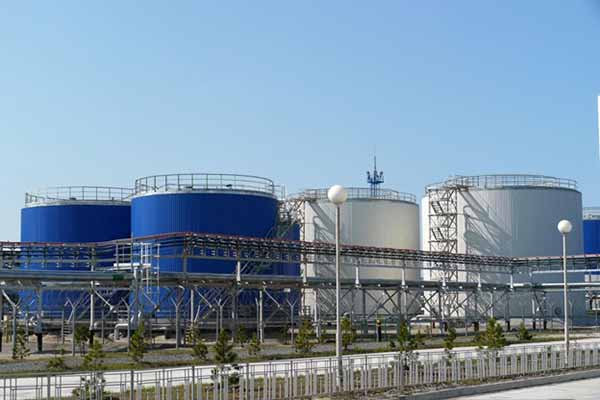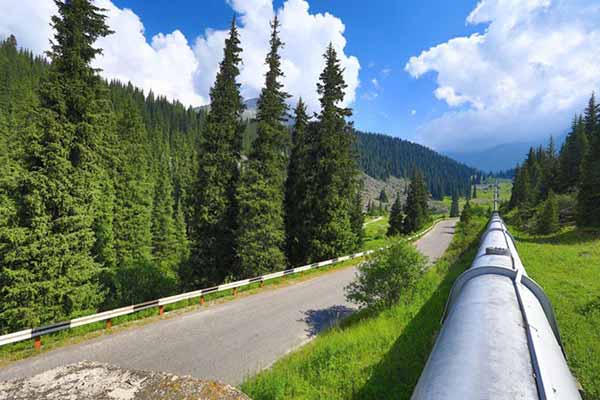The EU has drawn up a 195-billion-euro ($205.5 billion) plan to permit it to reduce its reliance on Russia’s oil and gas by 2027. The plan includes increased investments in renewable energy — including solar and hydrogen — and new infrastructure to facilitate imports of liquefied natural gas (LNG) from new suppliers. Meanwhile, Russia itself has imposed sanctions on some European energy companies and has said it can no longer do business with them or supply them with gas. It has already ended supplies to Poland and Bulgaria.
EU Drafts Energy Plan to Eliminate Russian Fuel
The EU has drafted a plan to meet Europe’s energy needs while ending importation of oil and gas from Russia within the next five years.
The plan involves a mix of strategies including fast-tracking of permits for renewables, boosting energy efficiency across the bloc, and increasing imports of liquefied natural gas from places like Israel and Nigeria.
The draft proposal estimates a budget of just under 200 billion euros will be needed to make the plan a reality.
Using a proposed blend of binding laws and non-binding recommendations, the draft envisages raising EU targets currently in place for 2030. These include pursuing a target of getting 45% of the EU’s energy supply from renewable energy, 5% more than the current target for 2030, as well as reducing energy consumption by just over 12% in contrast to the current goal of 9% for 2030.
The EU draft, which still has to be finalized, also proposes a major increase in investments in solar energy production, and production plans for millions of tons of hydrogen.
It’s also proposed that European governments draw on the substantial funds allocated for COVID-19 recovery to help finance the implementation of the draft proposals.
New infrastructure will be required to facilitate the new fuel supplies, and will likely cost billions to build. At the same time, the plan is expected to save the EU nearly 100 billion euros in gas, oil, and coal imports each year.
Known as the RePowerEU strategy, the plan may be altered before its final adoption.
The EU is also being pushed by leading global corporations to do all it can to free itself of reliance on Russian fossil fuels. Companies such as Microsoft, Unilever, and Neiman Marcus have sent a letter to the EU Commission with some recommendations on how this can be achieved.
The CEOs of the multinationals pointed out in the letter that ending reliance on Russian fuels opens the way to make progress on the green transition and cut carbon emissions across the bloc.
About 70% of the EU’s emissions are the result of energy production and energy use. The EU has said it will stop importing oil from Russia by year end in response to the country’s invasion of Ukraine.
Fears Over Russia Cutting off Gas Supply to Europe
New sanctions imposed by Russia on European energy companies prohibit the transport of Russian gas through a pipeline owned by a Polish company, said Russian state gas company Gazprom.
The gas pipeline from Poland sends gas to Germany, but has not transported any gas in recent months. However, much of the natural gas to Europe is continuing to flow and is unlikely to be cut off immediately.
The shutting down of the Polish pipeline has stirred fresh fears in Europe about energy security amid escalating gas prices that have pushed up heating bills for many European households. Gas is used in Europe for heating and to generate electricity.
Gazprom’s announcement of prohibitions was followed by a rise in gas prices from 94 euros ($99) per megawatt-hour to 104 euros ($109). European governments are earnestly seeking to reduce the EU’s reliance on Russia, from which it gets 40% of its gas and 25% of its oil.
The Russian state company has already cut off gas supplies for Poland and Bulgaria because they refused to pay for their supply in rubles as Russia demanded. Germany is also facing sanctions from Russia and said it will lose about 10 million cubic meters of gas per day as a result.
The country’s vice chancellor said Germany will, however, be able to compensate for the loss by sourcing supplies from elsewhere.
A pipeline in Ukraine carrying Russian gas to Europe has also been shut down, this time by the Ukraine operator to prevent Russian soldiers controlling territory in the country from diverting gas to their use.
Though EU countries have replenished their gas supplies stored underground and have enough for the remainder of the year, they’ll likely need to ration gas supplies during the coming winter. There’s also some concern over the bloc’s ability to free itself of its dependence on Russia for gas supplies.
Canadian Government Backs $10 Billion Pipeline Loan
The expansion project of the Trans Mountain pipeline has secured a C$10 billion ($7.87 billion) loan from Canadian financial institutions, guaranteed by the federal government.
The government has denied accusations that it’s effectively subsidizing the fossil-fuel project, which is expected to increase the amount of oil passing daily from Alberta to the West Coast.
The project was bought by the Trudeau government in 2018 after its original owners indicated they could no longer continue it in the face of concerted opposition from environmental activists. The expansion project is intended to increase the capacity of the existing pipeline to raise the amount transported daily along the route to nearly 900,000 barrels.
Canada’s finance minister had promised in February that the government would not provide further funds for the project, which has outgrown its original budget estimate of C$12.6 billion ($9.8 billion) by roughly C$9 billion.
The government says the new cost estimate is expected to hold and the project should be completed by 2023. It says its guarantee of the loan is “common practice” and a form of insurance for investors.
Pipeline Owners Fined Again After Multiple Warnings
The owners of a natural gas pipeline project in British Columbia, Coastal GasLink, have been fined again for their failure to comply with orders designed to safeguard the environment.
They began work on the pipeline project in 2019 amid stiff opposition from environmentalists and indigenous-rights groups, and have so far received 37 warnings, 16 orders, and two penalties in the form of fines.
The project, valued at C$6.6 billion ($5.1 billion), has been described as Canada’s largest private-sector investment; it’s designed to carry natural gas to a terminal in the north from where the gas will be exported to Asia.
The cost overruns were caused by a number of factors, including a project redesign as well as severe flooding in one area that led to construction being delayed for three months.
Meanwhile, the government is seeking to fulfill its election promise to remove all inefficient fossil-fuel subsidies and is currently seeking to define exactly what can be categorized as such.
New Zealand to Spend $357 Million on EV Program
New Zealand’s prime minister announced that low-income families will receive help to replace their combustion-engine vehicles with electric or hybrid ones through a $357 million fund to be established.
The scheme is a trial program and is to be adopted along with other measures for reducing the country’s carbon emissions, as it strives to reach its target of net zero by 2050.
Among other emissions-reduction measures being contemplated are more transportation options, including cycling and walking, to encourage less use of cars, and granting businesses subsidies to help them green their operations. The government also hopes to green its entire bus fleet by 2035.
The government pointed to New Zealand’s exposure to rising sea levels due to climate change as an important reason to reduce emissions that lead to global warming. The measures are expected to be funded by polluters eventually, instead of by the country’s tax payers.
However, critics say the proposals are deficient in a number of areas.
Repsol Facing $4.5 Billion Lawsuit Over Oil Spill
Peruvian authorities have filed a lawsuit against the Spanish firm Repsol, seeking $4.5 billion in damages for an oil spill in January that adversely affected hundreds of thousands of residents, including fishermen, and led to many businesses and beaches being closed.
The spill occurred while a tanker was unloading crude oil at a Repsol refinery north of Peru’s capital. The company said the accident happened because of rough seas triggered by the eruption of the Tonga volcano.
The Peruvian consumer protection agency that has filed the suit said it may well set a precedent for bringing similar suits in the future for oil spill-related damage. It’s seeking $3 billion to compensate for the damage done to Peru’s coastal environment and another $1.5 billion to compensate the businesses and communities affected by the spill.
Repsol, however, has described the sums sought as lacking any sound basis.
The court hearing the suit will determine the final figure to be awarded. Reports indicate that hundreds of fishermen are still unable to work, following the spillage of 12,000 barrels of crude in January.
The tanker involved in the accident has been held by the Peruvian authorities.
Opinion writer: Jewel Fraser
The opinions, beliefs, and viewpoints expressed by the various authors do not necessarily reflect the opinions, beliefs, or viewpoints of Interactive Energy Group, LLC (IEG) or its parent companies or affiliates and may have been created by a third party contracted by IEG. Any content provided by the bloggers or authors are of their opinion and are not intended to malign any individual, organization, company, group, or anyone or anything.
Brought to you by energysavings.com
All images licensed from Adobe Stock.
Featured image:



